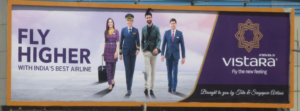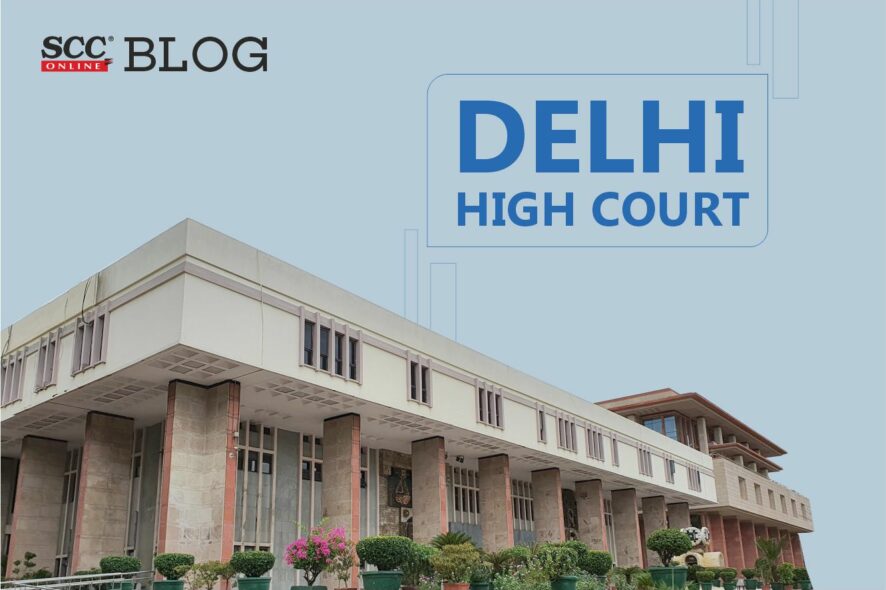Delhi High Court: In a suit filed by Frankfinn Aviation Services Private Limited (‘plaintiff’) seeking permanent and mandatory injunction restraining the Defendant inter alia from infringement of trademark ‘FLY HIGH’, passing off, unfair competition, dilution and for rendition of accounts, Jyoti Singh, J., vacates an interim injunction order passed against the defendants and held that the defendant is not using the expression ‘FLY HIGHER’ as a trademark with an intent to deceive, misrepresent or confuse members of the public but is rather used in the manner being descriptive of its services and for purpose of promotion and advertisement.
The Plaintiff claimed being the original adopter, user as well as registered proprietor of the trademark ‘FLY HIGH’, which was coined and adopted in the year 2004 and has been continuously, extensively and uninterruptedly used for imparting training in hospitality, aviation, travel management and customer services, with largest network of state-of-the-art centres across India as well as in Dubai.
The grievance of the Plaintiff is that the Defendant, who operates its full-service airline under the trademark, for promoting its services under the mark ‘FLY HIGHER’ on various online platforms and social media websites has in a brazen and blatant manner copied the registered trademark of the Plaintiff ‘FLY HIGH’ and is using the same for allied and cognate services. Defendant also uses the trademark ‘FLY HIGHER’ as a hashtag on its website and services of the parties to the lis pertain to the same sector, i.e., aviation, confusion. An ex parte ad interim injunction dated 21-01-2022 has been granted in favour of the Plaintiff by the present Court.
The Court noted that the plaintiff is a registered proprietor of the trademark ‘FLY HIGH’ and thus by virtue of provisions of Section 28(1) of Trade Marks Act, 1999, it has a statutory right to use the mark exclusively as also seek protection against infringement by third parties.
Issue 1: Whether the registration of the trademark FLY HIGH by the Plaintiff can prevent the Defendant from using FLY HIGHER?
On perusal of the screenshot given below, the Court noted that the defendant is using the phrase FLY HIGHER in conjunction with its well-known trademark VISTARA and the logo.
The Court further noted that as per legislature, ‘trademark’ and ‘mark’ has two different connotations and in order to qualify as a trademark it must be capable of distinguishing the goods and services of one person from the others and it must be used or proposed to be used in relation to goods or services for indicating a connection, in the course of trade, between the goods or services and the person having the right to use the mark either as a proprietor or as a permitted user. Trademarks, therefore, are intangible assets of the proprietors, which serve as ‘source identifiers’, instantly connecting the goods/services with the proprietor thereof.

Placing reliance on Cadila Health Care Ltd. v. Gujarat Co-operative Milk Marketing Federation Ltd., 2009 SCC OnLine Del 2786, Bata India Limited v. Chawla Boot House, 2019 SCC OnLine Del 8147 and Red Bull AG v. Pepsico India Holdings Pvt. Ltd., 2022 SCC OnLine Del 969 the Court noted that if the Defendant can demonstrate that its use of the allegedly infringing trademark is not as a trademark but merely descriptive of its goods, it can escape the rigours of Section 29 of Trade Marks Act, 1999.
The Court remarked that the Plaintiff and Defendant operate in an entirely different field and industry. Defendant is operating a full-service Airline under its well-known trademark, while the Plaintiff is engaged in running a training Institute under the FRANKFINN mark.
The Court concluded that the defendant is right in stating that the phrase FLY HIGHER is only used in conjunction with its well-known mark VISTARA and with a sole purpose of advertising and promoting its scheduled Airline operating under and is not used as a trademark. Thus, the Court based on various documents placed on record held that FLY HIGHER is a generic term and common to aviation services and does not serve as a source identifier to distinguish Defendant’s goods and services from its competitors, and cannot be termed as a ‘Trade Mark’, as defined under the Act.
Issue 2: Whether there is a likelihood of confusion as to the origin of the services offered by the Defendant?
The Court noted that the underlying ethos of an infringement action under Section 29 of the Act is: (a) proprietary rights of a registered owner; and (b) public interest. Therefore, a very important ingredient of an action of infringement is the likelihood of confusion and/or association amongst the intending purchasers.
The Court further noted that the plaintiff’s target audience are people seeking soft skills training in the travel, tourism, hotel management and Aviation sector with the hope of possible employment opportunities while Defendant’s customers comprise travellers who choose to fly with Vistara Airlines. It further opined that the defendant’s customers comprise well-informed discerning people, who would not choose to travel with Vistara airlines, based on Plaintiff’s repute in the training Institute.
Thus, the element of likelihood of confusion or members of the public or trade associating the services offered by the Defendant as emanating from the Plaintiff, is lacking in the present case as ingredients of Section 29(1) and (2) Trade Marks Act, 1999 are not satisfied.
The Court held that the way the phrase FLY HIGHER is being used by the Defendant does not appear to be with an intent to deceive, misrepresent or confuse members of the public and the prominent use of the well-known trademark in conjunction with the phrase FLY HIGHER further defies any intent of the Defendant to misrepresent, contrary to the stand of the Plaintiff. Hence, Plaintiff has failed to establish a prima facie case of passing off against the Defendant.
The Court vacated the ex parte ad interim injunction order granted by this Court vide order dated 21-01-2022.
[Frankfinn Aviation Services Private Limited v. Tata Sia Airlines Ltd., 2022 SCC OnLine Del 3550, decided on 28-10-2022]
Advocates who appeared in this case:
Mr. Chander M. Lall, Senior Advocate with Mr. Kapil Midha, Ms. Versha Singh and Ms. Ananya Chug, Advocates for the Plaintiff;
Mr. Akhil Sibal, Senior Advocate with Ms. Kruttika Vijay, Mr. Aditya Gupta, Mr. Mukul Kochhar and Ms. Asavari Jain, Advocates for the Defendants.
*Arunima Bose, Editorial Assistant has reported this brief.






